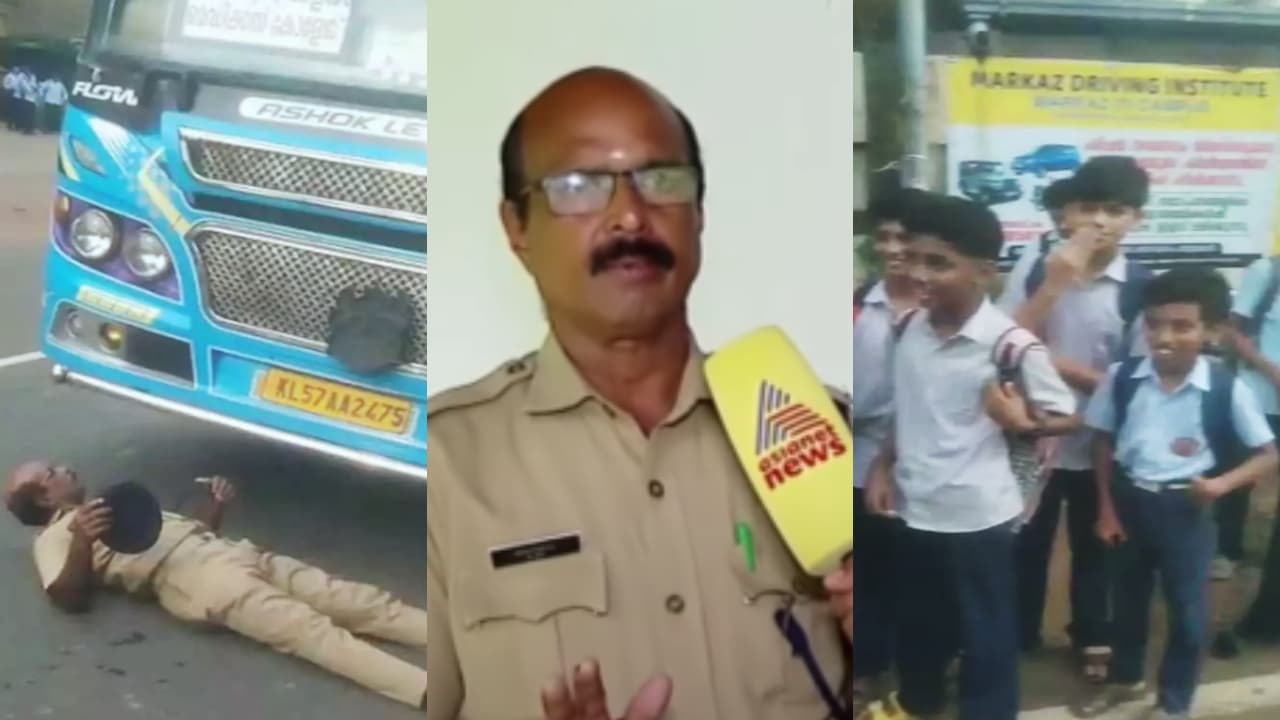The Kerala High Court had urged stricter action against reckless private bus driving, including heavier fines and vehicle seizures, following recent fatal accidents. The court also emphasized maintaining mandated gaps between buses.
Kozhikode: A Home Guard in Kerala made headlines after lying down in front of a bus that refused to pick up students, forcing it to stop. The dramatic incident unfolded in Karanthur, Kunnamangalam, around 4:40 pm on August 8, near the Karanthur Marqus bus stop. Home Guard Nagaraj intervened when the bus, named Niya and headed towards Kozhikode, attempted to leave without boarding students despite police instructions. Ignoring orders to take all waiting children, the driver tried to move on — until Nagaraj lay down in front of the vehicle, preventing it from advancing. His bold action drew cheers and applause from onlookers and students. Traffic police had been monitoring the location following numerous complaints that buses were neglecting students at this stop. Locals and students are now calling for a case to be filed against the driver.
Speaking to Asianet News, Nagaraj said that after school ends at 4 pm, many children are left waiting until 5 or 6 pm because buses refuse to take them. “The problem could be easily solved if each bus took just 10 students. But they refuse. We are forced to stand in the middle of the road and stop them. Yesterday, when I asked the bus to stop, it stopped just short of hitting me. I lay down on the road, stating that the bus couldn’t leave without the children. They are obligated to stop when someone in uniform signals them to. The children were very happy,” he added.
Kerala HC Asks State to Take Action Against Private Buses
Meanwhile, the Kerala High Court has once again instructed the state government to take strong measures to curb reckless and competitive driving by private buses in Kochi. The court also directed authorities to revise and update the time schedules for buses operating on various routes. Emphasizing the need for stricter penalties, Justice Amit Rawal’s Bench suggested imposing heavy fines on violators, with even steeper fines for repeat offences. If monetary penalties fail to deter such behaviour, the court said offending buses should be seized. It also noted that revising bus schedules could help prevent dangerous driving.
The court pointed out that reckless driving often occurs openly, even in the presence of High Court judges’ official vehicles. It reiterated that the mandated gap between buses—five minutes for urban routes and ten minutes for rural routes—must be maintained to prevent buses from clustering on the same route, which often leads to unsafe competition on the roads. The case, triggered by a series of fatal accidents involving private buses, including the deaths of two young motorcyclists in the past week, is scheduled for the next hearing on August 19.
Earlier this month, the High Court had noted that reckless driving incidents and related accidents persisted despite several previous orders. It had stressed that the police and Motor Vehicles Department must adopt effective deterrent measures. The court rejected the argument that an “unscientific” timetable justified unsafe driving and expressed disappointment over the lack of follow-up on its earlier directive to display enforcement officials’ phone numbers inside buses. Following that order, stickers with contact numbers for enforcement personnel were placed in some city buses, allowing the public to report violations.
